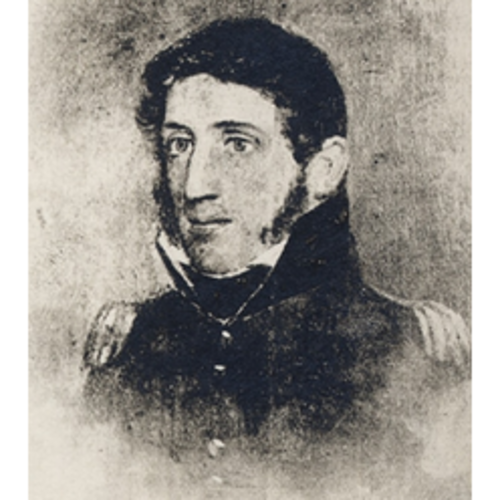GODEFROY DE TONNANCOUR, JOSEPH-MARIE (he signed J. M. Tonnancour), army and militia officer, jp, seigneur, office holder, and politician; b. 15 Aug. 1750 in Trois-Rivières (Que.), son of Louis-Joseph Godefroy* de Tonnancour and Louise Carrerot; m. 23 Aug. 1785 Marie-Catherine Pélissier in Yamaska, Que., and they had 15 children, including Léonard*; d. there 22 Nov. 1834.
The Godefroy de Tonnancour family had lived in the Trois-Rivières region from the town’s earliest days, and they enjoyed a privileged position as merchants, seigneurs, and office holders. The much-coveted office of king’s attorney in the Government of Trois-Rivières passed from Joseph-Marie’s great grandfather, Louis Godefroy de Normanville, to his grandfather, René Godefroy* de Tonnancour. His father, Louis-Joseph, who also held the office, was at the same time king’s storekeeper, one of the richest merchants in Trois-Rivières, and owner of numerous fiefs. He lost his offices and part of his fortune following the conquest of New France by the British.
Joseph-Marie, a worthy son of a rich family, excelled as a student, first at the Petit Séminaire de Québec from 1765 till 1771, and subsequently in Paris at the Jesuit Collège Louis-le-Grand where he did his classical studies. He then went to England to attend the University of Oxford, and some sources even claim that he was the first Canadian to take courses there.
Tonnancour returned to the province of Quebec in 1775 and, like his father and his brother Charles-Antoine*, was caught up in the American War of Independence, which had just begun. That year he helped defend Fort St Johns (Saint-Jean-sur-Richelieu) when it was besieged by the Americans. The garrison held out for 45 days before surrendering in early November. Tonnancour was made a prisoner and taken off to the American colonies. After being liberated in an exchange of captives in 1777, he remained in the army until hostilities ended with the signing of the Treaty of Paris in 1783. The following year he became colonel of the Trois-Rivières militia battalion, in which he served until 1831.
In 1784 Tonnancour went to live in the seigneury of Yamaska, which belonged to his father. When the latter died that year he inherited part of the fief, and after numerous transactions with his sisters and brothers he became its sole owner in 1787. According to one of his contemporaries, he apparently was held in the highest esteem as a seigneur. He was reputed to be a very humane man. There are also indications that he put his considerable knowledge and notable scientific mind at the service of the Yamaska townsfolk. For example, in the face of prejudice and superstition, he led a campaign for vaccination against smallpox of which several thousand people took advantage.
In 1788 Tonnancour, like a number of other seigneurs, signed a petition to the king opposing the constitutional reform, being sought by the colony’s merchant bourgeoisie. In the summer of 1792 he was elected to the Lower Canadian House of Assembly for Buckingham, along with the seigneur of Beauport, Antoine Juchereau* Duchesnay. He represented the riding until 1796 and voted with the Canadian party.
In 1784 Tonnancour had obtained a commission as justice of the peace for the district of Montreal. He received a similar commission for the district of Trois-Rivières in 1788, 1790, and 1799 and for the district of Quebec in 1794. In 1791 he sat as a judge under a commission of oyer and terminer and general jail delivery. In 1819 he, his brother-in-law Thomas Coffin*, Charles Thomas, and Joseph Badeaux were appointed commissioners for the building of churches and presbyteries in the district of Trois-Rivières. Finally, he became commissioner of roads and bridges in 1831.
Tonnancour felt the constraints ensuing from the conquest and was unable to take up the lucrative commercial pursuits in which his family had engaged. This was the situation facing the seigneurial class, which continued to enjoy privileges it had acquired but could not capitalize on its patrimony. Such circumstances pointed to the decline of a class whose position was threatened by the dominance of the merchant bourgeoisie and the coming of the industrial era.
ANQ-M, CE3-5, 23 août 1785, 24 nov. 1834. ANQ-MBF, CE1-48, 16 août 1750. PAC, MG 24, I97; RG 68, General index, 1651–1841. L.C., House of Assembly, Journals, 1792, 1835. Quebec Gazette, 13 Nov. 1788, 8 July 1790, 4 June 1812, 26 Nov. 1819, 27 Dec. 1820, 5 Dec. 1822. F.-J. Audet, “Les législateurs du Bas-Canada.” Officers of British forces in Canada (Irving). P.-G. Roy, Inv. concessions, 3: 264–65. Hyamaska, Yamaska, Maska, 1727–1927 (s.l., 1977). P.-G. Roy, La famille Godefroy de Tonnancour (Lévis, Qué., 1904). F.-J. Audet et Édouard Fabre Surveyer, “J.-M. Godefroy de Tonnancour,” La Presse, 5 nov. 1927: 57, 72.
Cite This Article
Martin Rochefort, “GODEFROY DE TONNANCOUR, JOSEPH-MARIE (J. M. Tonnancour),” in Dictionary of Canadian Biography, vol. 6, University of Toronto/Université Laval, 2003–, accessed January 1, 2026, https://www.biographi.ca/en/bio/godefroy_de_tonnancour_joseph_marie_6E.html.
The citation above shows the format for footnotes and endnotes according to the Chicago manual of style (16th edition). Information to be used in other citation formats:
| Permalink: | https://www.biographi.ca/en/bio/godefroy_de_tonnancour_joseph_marie_6E.html |
| Author of Article: | Martin Rochefort |
| Title of Article: | GODEFROY DE TONNANCOUR, JOSEPH-MARIE (J. M. Tonnancour) |
| Publication Name: | Dictionary of Canadian Biography, vol. 6 |
| Publisher: | University of Toronto/Université Laval |
| Year of publication: | 1987 |
| Year of revision: | 1987 |
| Access Date: | January 1, 2026 |



